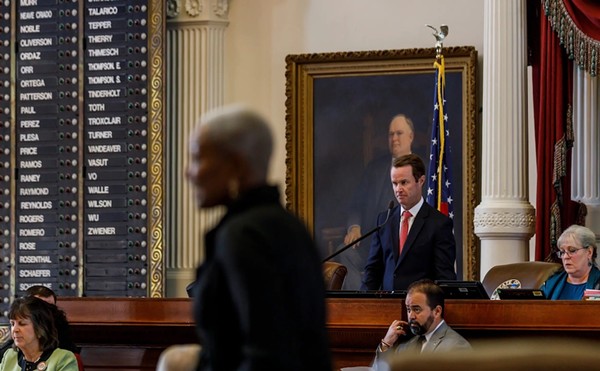Back in mid-August, Bexar County Commissioner Kevin Wolff toured the Haven for Hope campus with Haven CEO George Block and others for the annual budget-season “shakedown,” as Wolff terms it. Block, bracing for heavy state funding cuts on the way, was hoping the county could contribute more than the $50,000 the county’s proposed 2012 budget already sets aside for the nonprofit’s sprawling homeless services campus.
“I told them it’s not my budget you want — our operating budget dries up real quick,” Wolff recalled saying. “What you want is the sheriff’s budget.”
Haven is not the only nonprofit reaching to the ropes this year for help. The city’s budget is tapped, the Legislature’s serious cuts start to materialize this month, and there is little hope for more federal dollars as the details of a spending cap are negotiated in Congress. In Bexar County, where stagnant property tax rolls have commissioners pinching every penny they meet, Wolff sees millions in savings to be had by privatizing the county lockup. But to get there, he’ll have to bust the law-enforcement union first.
Wolff, the court’s one conservative, readily admits a general distaste for organized labor – “As a Republican,” he said, “I’m going to have issues with union representation as a general rule of thumb.” But now he’s openly trying to quash the Deputy Sheriff’s Association of Bexar County, claiming its heavy influence over department policy has kept the county from running a tighter ship at the jail.
The sheriff’s department eats up roughly a third of the county’s $320 million general-fund operating budget on law enforcement and detention – the jail, the county’s largest line-item expense, makes the department a prime target during budget season, which ends with the final commission vote on Sept 13. Farming out jail operations would free up the sheriff’s office to focus solely on law enforcement, Wolff insists, noting the explosion in the county’s unincorporated areas over the past decade. “A city the size of Waco has moved in over the past 10 years,” Wolff said. “I want to have more law enforcement, that’s what my constituents want.”
Though commissioners determine the final dollar amount to give the sheriff’s department, their influence ends there, Wolff says. Right now, Sheriff Amadeo Ortiz enjoys the final word in how that money is spent, and Wolff doesn’t mince words in suggesting he thinks Ortiz has done a poor job. Holding up a County Auditor’s report drafted in early August showing the jail’s inmate bank, which holds cash and property for inmates passing through the jail, has kept nearly $110,000 belonging to released or transferred inmates, money the jail hadn’t reported to the State Comptroller or County Auditor, Wolff says: “This is what I consider piss-poor management.”
Still, the county can’t just unilaterally seize control of the jail. Ortiz would have to hand it over, something he’s unlikely to do, especially while the union stands. “I can’t just take jail operations from [Ortiz], but he can give them to me,” Wolff said with a smirk. “If [the union’s] standing in the way of that, then we can get rid of them,” he said, claiming he’s ready to lead a petition drive that would put repealing the union to a public vote. Wolff says he’s got more than enough support to reach the roughly 15,000 signatures needed to get the item on the ballot.
While the Bexar County Deputy Sheriffs Association won collective bargaining rights in 2006, union officials and the county have fought, unsuccessfully, for over two years to hammer out a new deal since the first contract ran out in 2009. The long fight has left a fair amount of bad blood simmering between Wolff and union leaders.
Last month, as part of his plan to cut 2011-2012 county spending by some $11 million, County Manager David Smith laid out plans to cut 128 jail positions through attrition, retirement, and shifts within the sheriff’s office, a plan Wolff heartily backs. While Ortiz has countered he can only handle losing 75 positions, Wolff claimed that at a recent lunch a top jail official told him it was the union that set the bar at 75. “That’s when I really started to get pissed off,” he said.
To further inflame tempers, with contract negotiations languishing the union last week filed two lawsuits against the county. One suit cites the county’s refusal to deduct money from paychecks that eventually flows into the union’s political action committee, something the county now contends is illegal. The second suit accuses the county of bargaining in bad faith. Sitting at his desk last week, waiving the lawsuit, Wolff said, “This is crap … If I wasn’t set on [the petition drive], I sure as hell am now.”
In his recommendation to cut jailers, Smith says inmate-reduction strategies at the county level have begun to pay off, citing steadily decreasing jail populations over the past three years. According to county stats, the jail, with a stated capacity of 4,596 inmates, topped 4,611 inmates in the summer of 2009, when inmate populations typically peak – jail administrators later admitted the intense overcrowding may have played a role in record number of jail suicides that year.
The population decreased to 4,137 in the summer of 2010, and this past summer topped out at 3,784 inmates.
Smith points out that despite the flux, the jail staffing has held steady at 930 detention officers. His plan, which would save the county over $4 million, is to staff the jail for a population of roughly 4,000, something that deeply worries the union. “The problem we’ve always had is that the jail population is not something you can control all the time,” said Hector Garcia, a union board member and an officer at the jail. “They’re not aware of the realities of the jail. … I challenge anyone who wants to go to the jail to come out here. I’ll take them on a tour, show officers who can’t even take bathroom breaks because we’re so stretched.” In its lawsuit, the union claims no self-respecting organization could agree to such cuts, saying the plan essentially asks for union negotiators to sell out their own members.
Steven Long, just a week into his term as union president, said, “We’re not the ones mismanaging, so I think Kevin’s obviously got that fact wrong.” He contents Wolff’s new union-busting stance is simply a bargaining chip, a blatant threat to push union leaders into accepting the county’s latest deal, which included an across-the-board 7.25 percent wage increase, according to the County Manager’s office. “We don’t think what’s laid out (new jail staffing levels) are safe. … You’re talking about a safety issue here, not just for the officers but for the inmates,” Long said. “Look, Kevin’s threatening after we filed that lawsuit. That’s what this is, isn’t it? This is just a threat because we filed that suit.”
Wolff claims he’s serious about privatization and is already in “research mode,” having visited privately-run jails and pushing for other commissioners to do the same. He claims analysis from his own office shows the county could save anywhere from $7 to $10 million a year if it opted for full privatization.
In his meeting with Haven’s Block and others last month, Wolff seized the opportunity to deliver a lesson, expounding on the supposed fiscal mismanagement at the jail, along with the benefits of privatizing and union busting. Apparently the lesson stuck. Days later, Block heralded Wolff’s vision in his Express News-hosted blog. “When Kevin popped the manhole cover off the fiscal sewer that the Bexar County jail has become, the stench was awful, but the opportunity is huge,” wrote Block. If he can get others to march in line so easily, Wolff may gain traction yet. •


















